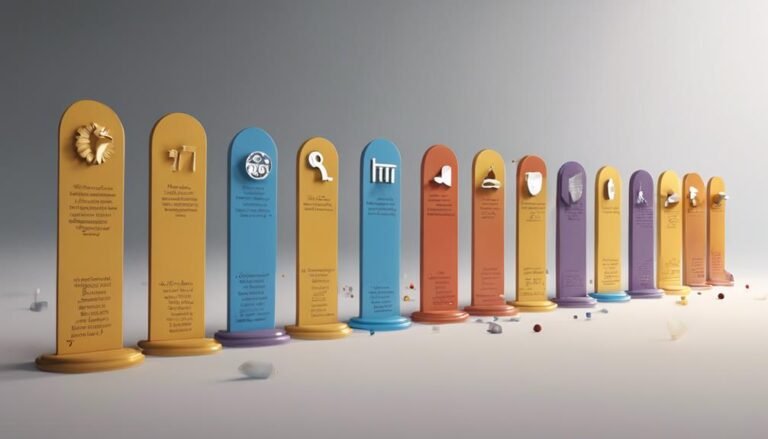Personality Compatibility in Relationships
Imagine a delicate dance between two individuals, each step a reflection of their unique personalities intertwining. Compatibility in relationships is like a puzzle waiting to be deciphered, where understanding your partner's quirks and traits is the key to unraveling a harmonious connection. But how do you navigate the intricate maze of personalities to create a fulfilling and lasting bond? Let's explore the nuances of personality compatibility and discover the secrets to nurturing a thriving relationship.
Key Takeaways
- Understanding personality compatibility is vital for strong relationships.
- Compatibility factors impact relationship dynamics significantly.
- Balancing contrasting traits enhances communication and decision-making.
- Respecting unique qualities and differences strengthens the bond.
- Building emotional connection and embracing differences nurture a healthy relationship.
The Importance of Personality Compatibility
Understanding the significance of personality compatibility is essential for building strong and lasting relationships. When it comes to relationship dynamics, compatibility factors play an important role in fostering a deep connection between partners. Compatibility isn't solely about sharing similar interests or hobbies; it explores the core values, communication styles, and emotional intelligence of individuals.
For relationship success, it's essential to recognize how emotional intelligence influences interactions with your partner. Being emotionally intelligent allows you to navigate conflicts effectively, understand your own emotions, and empathize with your partner's feelings. This awareness can lead to healthier communication patterns and a more harmonious bond.
Different Personality Types
Understanding relationships involves recognizing the impact of different personality types on interactions and dynamics between partners. Personality traits such as introversion, extroversion, openness, agreeableness, and conscientiousness play a significant role in shaping how individuals perceive and respond to each other.
When partners have compatible personality traits, relationship dynamics tend to be smoother, leading to greater harmony. For example, if one partner is highly organized and the other is more spontaneous, finding a balance between structure and flexibility can be crucial for maintaining a healthy relationship.
Compatibility in personality traits can enhance communication, problem-solving, and decision-making within a relationship. Appreciating and respecting each other's unique qualities and differences is vital, as these can complement and strengthen the bond between partners.
Impact on Communication Styles
Communication style differences can greatly influence how you interact with your partner. Understanding non-verbal cues and verbal nuances can help bridge the gap between your personalities.
Learning to resolve conflicts peacefully, considering each other's communication styles, is key to maintaining a healthy and harmonious relationship.
Communication Style Differences
Moving through differing communication styles in a relationship can be challenging but essential for fostering mutual understanding and connection. Verbal cues and body language play important roles in conveying messages effectively. It's essential to pay attention not only to what your partner says but also how they say it.
Tone interpretation is key; the same words can have vastly different meanings depending on the tone used. Understanding your partner's emotional expression can prevent misunderstandings and conflict.
When your partner communicates, take note of their tone and body language. Are they speaking calmly or with a sense of urgency? Are they making eye contact or avoiding it? These subtle cues can provide insight into their feelings and intentions.
Understanding Non-Verbal Cues
Paying attention to your partner's non-verbal cues is essential for enhancing your understanding of their emotions and intentions during communication. Body language can speak volumes, sometimes even louder than words. By honing your emotional intelligence and being attuned to subtle gestures, facial expressions, and tone of voice, you can grasp the underlying message your partner is trying to convey.
When engaged in conversation, take note of your partner's posture, eye contact, and hand movements – these can provide valuable insights into their feelings and mindset.
Understanding non-verbal cues goes beyond words; it explores the world of unspoken communication that can deepen your connection with your partner. By being observant and receptive to these cues, you demonstrate empathy and show that you value what your partner is expressing beyond verbal dialogue.
Practice interpreting non-verbal signals with an open mind, and remember that effective communication involves not just what's said, but also what's felt. Strengthening your ability to decipher these cues can lead to more meaningful and harmonious interactions with your partner.
Resolving Conflicts Peacefully
Recognizing the role emotions play in shaping your interactions with your partner is crucial to navigate conflicts peacefully and understand how they impact your communication styles.
Emotions can often run high during disagreements, leading to misunderstandings and escalation. To achieve peaceful resolution, consider implementing conflict de-escalation techniques. When tensions rise, take a step back, breathe, and try to approach the situation with a calm mindset.
Effective communication is key in resolving conflicts peacefully. Listen actively to your partner's perspective, express your thoughts clearly, and avoid blaming or criticizing. Utilize compromise techniques to find common ground and work towards a solution that satisfies both parties.
Conflict Resolution Strategies
Hey there, managing conflicts in relationships can be challenging, but having effective communication skills is key to finding common ground.
By practicing active listening techniques, you can truly understand each other's perspectives and work towards resolutions that honor both of your feelings.
Effective Communication Skills
Managing conflicts in relationships requires developing effective communication skills that can help both partners express their feelings and needs constructively. Vital listening plays an important role in effective communication, allowing you to truly understand your partner's perspective.
By paying attention to both the spoken words and the underlying emotions, you can foster an emotional connection that strengthens your bond.
During disagreements, practice vital listening by giving your partner your full attention without interrupting. Reflect back what you've heard to make sure you understand correctly before expressing your thoughts. This approach shows empathy and validates your partner's feelings, paving the way for a more productive conversation.
When conflicts arise, focus on maintaining an emotional connection rather than winning the argument. Speak from a place of understanding and compassion, using 'I' statements to express your feelings without placing blame.
Finding Common Ground
During conflicts in relationships, finding common ground through effective resolution strategies is essential for fostering understanding and maintaining a healthy connection. When disagreements arise, it's vital to focus on shared interests and values that both you and your partner hold dear. By recognizing these commonalities, you can work towards compromising differences in a way that honors each other's perspectives.
To find balance in resolving conflicts, it's important to approach discussions with an open mind and a willingness to listen. Mutual respect should be at the core of your interactions, allowing each person to feel heard and valued.
Remember that finding common ground doesn't always mean you have to agree on everything; it means finding a respectful middle ground where both parties feel understood and acknowledged.
Active Listening Techniques
To improve conflict resolution in your relationship, practicing active listening techniques is essential for fostering understanding and effective communication. When engaging in conversations with your partner, make a conscious effort to truly listen to what they're saying without interrupting or formulating your response while they speak. This shows that you value their perspective and are committed to understanding their point of view.
Active listening involves not only hearing the words spoken but also paying attention to non-verbal cues, such as body language and tone of voice. By actively listening, you can improve understanding by reflecting back what your partner has said to make sure you have grasped their message accurately. This technique fosters empathy and shows your partner that you're invested in their feelings and experiences.
Additionally, ask clarifying questions to explore further into their thoughts and emotions. This indicates that you care about their perspective and are willing to engage in meaningful dialogue to resolve conflicts effectively.
Building Emotional Connection
Establishing a strong emotional connection is essential for nurturing a healthy and fulfilling relationship. Trust building is a foundational aspect that forms the bedrock of emotional intimacy.
To create a strong emotional bond, it's important to open up and share vulnerabilities with your partner. This vulnerability sharing fosters a deeper understanding of each other and strengthens the emotional connection.
Engaging in bonding activities together can also help solidify the emotional bond between partners. These activities can be as simple as cooking together, going for walks, or trying out new hobbies as a couple.
Sharing experiences and creating memories together can enhance the emotional connection and build a sense of togetherness. Remember that emotional connection takes time and effort to cultivate, but it's a crucial component of a successful and lasting relationship.
Embracing Individual Differences
By acknowledging and embracing the unique differences between you and your partner, you can cultivate a deeper understanding and appreciation within your relationship. Accepting uniqueness and celebrating diversity in personalities can lead to a more harmonious and fulfilling connection. Remember that differences in opinions, preferences, and ways of approaching situations are what make each of you distinct individuals. Honoring these differences can open up opportunities for growth and learning within your partnership.
While accepting disparaties is vital, it's also essential to embrace similarities. Finding common ground, shared values, or interests can create a sense of unity and strengthen your bond.
However, it's equally important to respect and value the aspects where you differ. These distinctions bring a richness to your relationship and offer opportunities for personal development.
Conclusion
So, as you navigate your relationships, remember that personality compatibility is key to creating a strong and lasting connection.
Did you know that couples who share similar values and communication styles are 20% more likely to have a successful relationship?
By understanding and embracing each other's unique traits, you can build a deeper emotional connection and navigate conflicts more effectively.
Keep investing in your compatibility and watch your relationship flourish.







